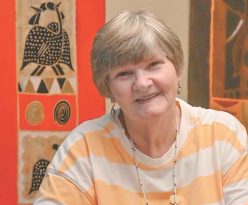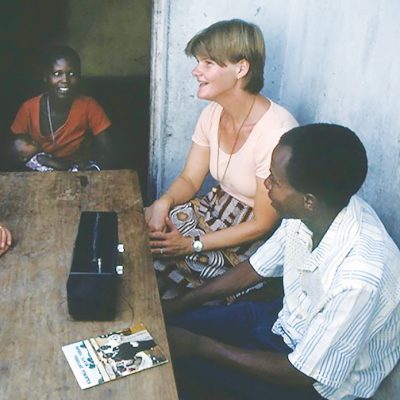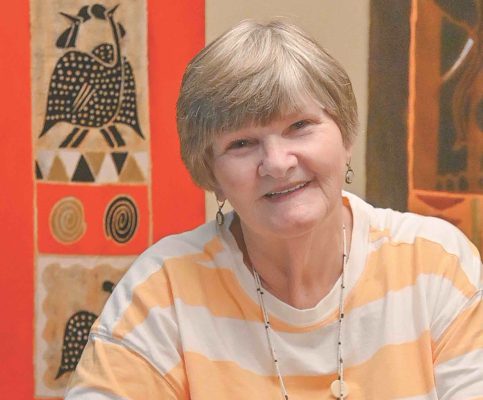On Sunday, Oct. 23, the Catholic Church throughout the world observes World Mission Sunday to recognize, thank and support those who have answered the call to be missionaries. Whether here at home or overseas, it is a day that Catholics recommit to their baptismal call to spread the Gospel through prayer, participation in the life of Church and in their everyday living. In his message for World Mission Sunday, Pope Francis calls every Christian to be a missionary and witness to Christ. “The Church, the community of Christ’s disciples, has no other mission than that of bringing the Gospel to the entire world by bearing witness to Christ,” he wrote. To mark the day, The Central Minnesota Catholic interviewed two missioners who exemplify this year’s theme, “You shall be my witnesses.”
Missionaries from Minnesota have served around the world for many decades: disciples who bring the Gospel to the world by bearing witness to Christ.
One of the state’s longest serving missionaries was Maryknoll Father Dan Ohmann, a native of Greenwald. He served in Tanzania for more than 50 years and inspired many to discern a vocation to overseas mission work.

Liz Mach and Dianne Mistelske are two of those people. They spoke to The Central Minnesota Catholic recently about their mission experience.
Mach heard Father Ohmann speak 1976 at her home parish of Immaculate Conception of Mary in Pine City, Minnesota, shortly after she graduated with a degree in nursing from what is now St. Catherine University in St. Paul. She was moved by his “wonderful appeal that he needed nurses,” she said.
Mistelske met Father Ohmann at the Maryknoll Development House in the 1970s and was impressed with his soft-spoken personality, his enthusiasm and commitment, and his dedication to prayer, she said.
Both Mach and Mistelske said they were struck by Father Ohmann’s faithfulness and witness in being present to the people in Tanzania. His example and invitation helped them both to choose a life of service to the people of Africa.
“It is hard to put into words his deep, sincere goodness,” Mistelske said. “I was blessed to have worked with him for three years, and I’m still inspired by his commitment to mission.”

Mach began working with Father Ohmann in the Shinyanga Diocese — in a village named Ndoleleji. She spent six years there, three years longer than her original commitment.
“I thought, I could do that for three years,” she said. Her initial commitment turned into 44 years, making her the longest serving Maryknoll lay missioner ever.
“I loved the work and the work kept changing for me,” she said, reflecting on what made her stay so long.
“It started with a program that Dan wanted,” she said. “Going out to the villages and bringing health care, especially to women and children. And that just cemented in me the care of women.”
Later, she worked in the Mwanza Diocese, just north of Shinyanga, and eventually ended up even further north on the Kenyan border in the Musoma Diocese. She returned to Minnesota in 2020 and is now a member of Pax Christi in Eden Prairie, Minnesota.
“Through all the years, I just kept growing more and more and doing different forms of [women’s health care]. First out on clinics for pregnant moms and babies, then, working with women that had fistula [a childbirth injury that can result in incontinence],” Mach said. “I did a lot of research and found out that young women that had undergone female genital mutilation were more at risk.”
One of her main priorities was promoting education and providing safe havens for girls fleeing gender violence, including female genital mutilation, child marriages and sexual abuse, which was widespread in the region of Tanzania where she worked, she said.
“Women would come in and they were leaking urine,” she said. “It’s from a childbirth injury and the result is they’re never going to marry… . Who wants them around, is kind of how people felt. But when we could do the surgery and cure them, they got their life back.”

She became passionate about providing health care to women.
“People began to realize I was the one who would come and always be looking for women that had issues, to see if I could help them in any way,” she said. “It’s just like you go deeper and deeper, and I never finished getting down there to the bottom of it. So, I just kept working.”
Most people will never serve in this way, but Mach says they don’t have to.
“When I think of what kept me for 44 years, there were people praying for me from my parish for 44 years. I know these people … they were really my prayer partners,” she said. “You don’t have to go to [an overseas] mission. That’s what keeps most of us in mission — the people [at home] that are remembering us in prayer.”
Reflecting on her own witness, Mach remembered an older man in one of the villages asking her, “Why do you keep coming out here?”
“I just looked at him and I remember saying clearly — and it really hit me hard later on — ‘I come because there was this man named Jesus…,’ ” she said. “I knew in my heart that I was able to be out there and continue to be out there because of something deep in my own heart, in my faith. And so, to me, that faithfulness is part of the witness.”

Mistelske also was invited by Father Ohmann to serve in Tanzania, but her desire to serve began long before she met him.
When she was 10 years old, she heard President John F. Kennedy on television talking about the Peace Corps and was hooked. She knew that serving as a volunteer was what she wanted to do with her life, she said.
After graduating from Belgrade High School, Mistelske worked in the Maryknoll Development House in Minneapolis with Maryknoll priests from Minnesota who had served in mission in Africa.
“I thought, if I don’t ever get into the Peace Corps, this would just be so wonderful,” she said. “The more time I spent with them, the more I wanted to do something in the missions.”
She did end up serving in the Peace Corps. In 1976 she married her husband, John, who had been a Maryknoll seminarian and a former Peace Corps volunteer. The two joined the corps in Africa together and served two years in Botswana.
After they returned to the United States, the couple learned they would likely not be able to have children.
“So, I thought this is a perfect way to spend my life, to work in mission and serve other people,” she said. “We decided to join the Maryknoll Lay Mission program. We applied and were accepted and went to Maryknoll headquarters in New York for training.”
It was during the training that Father Ohmann approached them.
“He explained that he wanted to start a catechetical school in Ndoleleji, and knowing our history with Maryknoll he specifically wanted us to assist in getting it started and in running it,” she said. “Because the priests were usually at the outstations, it was important to have someone on site. We prayed about it and accepted the assignment.”
The Mistelskes worked with Father Ohmann in Ndoleleji for three years and returned to the United States only to realize they missed Africa. They returned to Botswana to work with the government there and then worked with Habitat for Humanity, spending a total of almost 20 years in mission.
Although they went into mission work thinking they would never have children of their own, they adopted two children in Africa. Then, during that process, they were surprised to be able to have a daughter and later a son of their own. The couple also took in a boy who was already 14, too old to officially adopt, and one of their daughter’s friends.
“I never ever dreamed, growing up in Belgrade, in this little, tiny town, that I would ever [do all of these things]” Mistelske said. “I was never going to get married and have children … but I just literally have seen the world and taken my kids along with me.”

Mistelske says that people don’t always realize what they can do. They often think that mission is something only others can do.
“But just by your presence, I think you are a witness to the Gospel — just supporting things that you know would be the things Jesus would tell you to do,” she said.
Mission isn’t just about helping people overseas, she said. Volunteering in your hometown can be mission, too.
“You try to encourage people to do it with you so that you can show them the benefit of not just doing it for the sake of the people you’re doing it for, but what it does for you as well,” she said. “I think that’s really important.”
Mistelske, a member of St. Francis Xavier Parish in Sartell, is retired but remains active in her community, serving as chair of the board of the Sartell Senior Center. She is also involved with a lay mission group in Florida, where she lived before returning to Minnesota.
Mach is currently working remotely writing grants and helping Maryknoll coordinate returning lay missioners, trying to get them more actively involved in the organization.
“With Maryknoll you have a whole family out there, a network of people,” Mach said. “They’re just great to be around and I’m grateful for that side of it. That’s helped me in coming back.”
Note: Watch your parish bulletins and envelopes for the World Mission Sunday collection happening in October. Donations also can be mailed to the St. Cloud Mission Office, 11 8th Ave. S., St. Cloud, MN 56301.






















